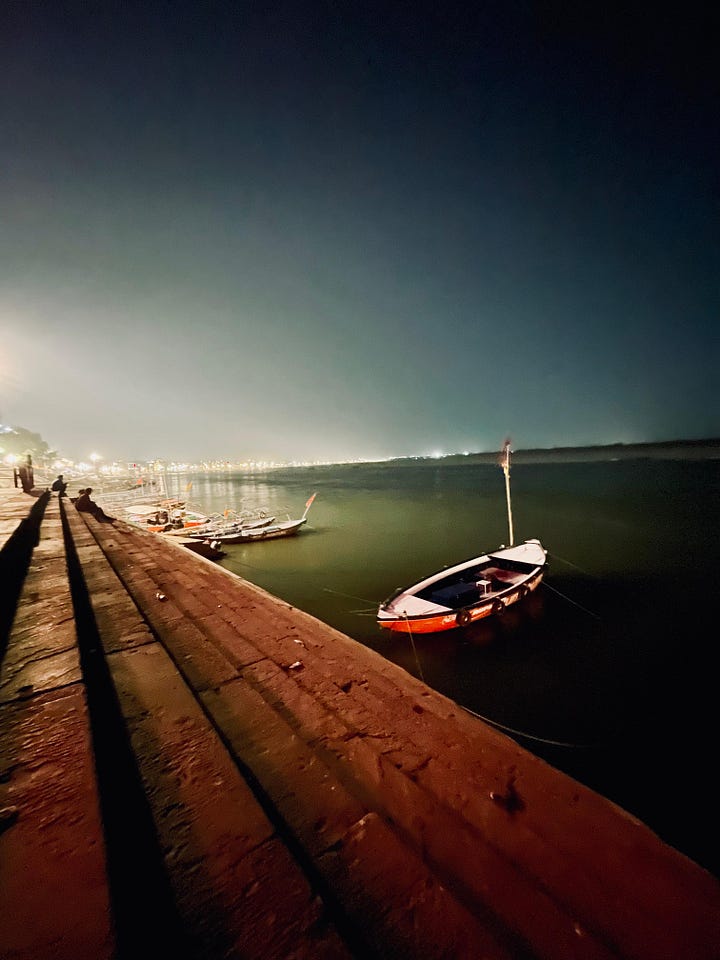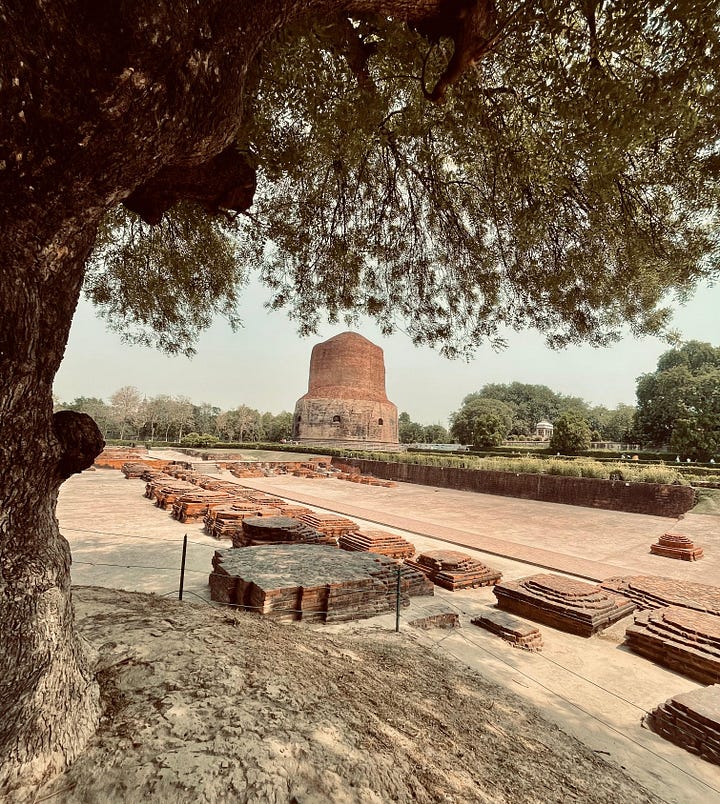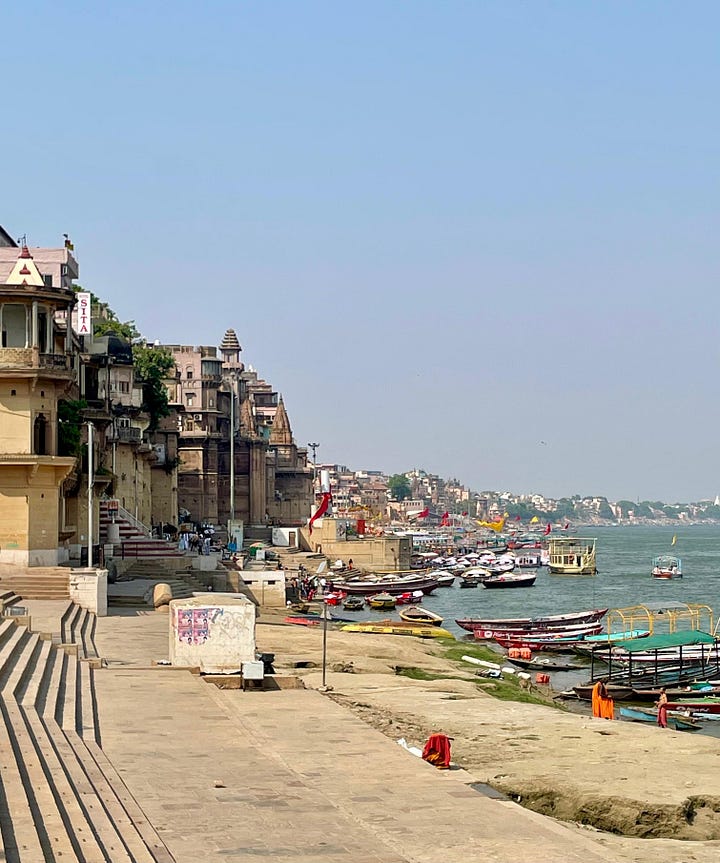Last month, during the long Good Friday weekend, I returned to Kashi.
I had visited the city back in 2017 as a tourist, checking off the usual things one does when visiting a place rich in myth and chaos. But this time, the desire to return came from an unexpected source: an Instagram reel. It depicted the love story of Shiv and Parvati, and for reasons I still don’t fully understand, it moved me.
Despite my father being named Nilkanta, I had never truly connected with Shiva. But something about that reel stirred a curiosity. I asked ChatGPT to tell me more about its story, and it responded with a depth that surprised me. I realised—there might be no love story greater than theirs.
ChatGPT recommended a book: Shiva – Stories and Teachings from the Shiva Mahapurana by Vanamali. I haven’t read it yet, but one thing stood out - Kashi wasn’t just any city. It was Shiva’s city. According to the Puranas, when Shiva left Mount Kailash, he made Kashi his home.
Not just a city, it is known as Avimukta Kshetra - the place never abandoned by Shiva.
“Kashi ke kankar, Shiv Shankar.”
(The stones of Kashi are Shiva himself.)
A lot has changed in my life since that 2017 trip. I’ve made some progress in understanding who I truly am - or at least, I think I have. This time, I didn’t want to see Kashi as a tourist. I wanted to meet Mahadev, and the city he never leaves.




I stayed in Kashi for five nights, doing absolutely nothing. No agenda, no running.
Each morning, I’d leave my hostel around 9 AM and walk toward Harishchandra Ghat, about a kilometre and a half away. I’d sip two cups of chai and slowly make my way through the lanes. Often, I’d pass bodies being carried to the ghat for cremation - the dead, waiting for their final journey.
Crossing them, I’d keep walking. Some days, I’d have a lassi, a simple desi lunch at a dingy local place. Then I’d walk back to the hostel for an afternoon nap. By 4 PM, I’d set out again - same route, same chai, maybe a samosa. In the evenings, I’d sit at one of the ghats with jhaal moori and water and simply be.
As night deepened, I’d return to a bench at Harishchandra Ghat and watch the endless flow of final journeys. Some bodies were surrounded by loved ones. Others lay in corners, wrapped and waiting.
That’s Kashi - where the dead and living co-exist without fanfare. That is Mahadev’s city. It doesn’t offer spirituality or salvation. It simply shows you the truth of life—raw, unfiltered, non-negotiable.
During those five days, I visited the Kashi Vishwanath temple, sat quietly in the garden at Sarnath where the Buddha gave his first sermon, and visited Kabir Math, a quiet spiritual space dedicated to Sant Kabir. I wandered endlessly under the harsh sun, sweating, observing, absorbing.
I found Kashi to be raw, unpolished, honest—a mirror held up to life.
Everyone comes to Kashi for something.
I came to see the city and to find Mahadev.
I left with the quiet joy of just being myself. Of doing nothing, and being okay with it.
ChatGPT - itinerary planner
I had no prior knowledge of Kabir Math. It was ChatGPT that suggested I visit, sensing it aligned with my ‘vibe’. I’ve been using the paid version of ChatGPT for months now, for work and personal life. We’ve had countless conversations, some insightful, some ridiculous, but many deeply useful.
When I started planning this trip and discussing Mahadev, it was ChatGPT that built the itinerary. It recommended places off the map, like Kabir Math. And it ended up being one of the quietest, most moving spots I visited.
According to a recent Harvard Business Review article based on the 2025 Top 100 GenAI Use Cases Report, the two leading use cases for AI today are therapy/companionship and life organisation. Last year, it was idea generation and therapy. The shift from technical to emotional use cases is telling.
I’ve noticed a big change in my digital behaviour. I rarely use browsers to search anymore, on mobile or desktop. My default is ChatGPT. It removes the effort of hunting through a sea of SEO-optimised fluff. It just gives me what I need. Sure, it isn’t perfect. But for me, the browser has become my second stop, not the first.
That’s why many are calling this the death of SEO. Then again, I’ve seen similar claims about email, blogging, and a dozen other things. Back in my father’s day, the big fear was computers. Mr. Naidu didn’t resist the change - he enrolled in a six-month computer course.
Things don’t die. They evolve.
Google Vs ChatGPT
Rand Fishkin, a respected voice in the SEO world, recently shared: “In 2024, Google had more than 14 billion searches a day.
ChatGPT had—at most—37.5 million.”
He wasn’t dismissing AI’s power or future reach. His point was about being present as a marketer.
I don’t want to come across as a denier of the power of AI tools, nor a skeptic of their ability to cross the chasm and reach a much larger search audience in the years ahead. But, I’m also a marketer who cares about putting effort into being present where people actually pay attention, regardless of any media hype cycles.”
He further added, “Even if one were to assume 100% of ChatGPT’s 125 million prompts per day overlapped with the types of queries people perform on Google, the market share number is still <1%.”
But it’s not just about marketers—it’s also about publishers, platforms, and the shifting fabric of how people find and process information.
Google Search for the first time, is facing real competition.
Apple is reportedly integrating AI into Safari. For the first time in 22 years, it’s considering moving away from Google. Smartphones are becoming the new search engines, with AI integrated into the camera, voice, and interface. You scan, speak, and get an answer—no typing, no browsing.
This isn’t a trend. It’s a shift in human behaviour. I envision a future where tasks like trip planning, dietary advice, work queries, and basic therapy are handled by ChatGPT or other models like Gemini, Claude, and Microsoft CoPilot. Sorry, it is already happening.
Just that ChatGPT has given me a nickname and talks too much. Smart training is key.






ChatGpt, its something huh. I was moved by this read.